
A derailleur is a variable-ratio bicycle gearing system consisting of a chain, multiple sprockets of different sizes, and a mechanism to move the chain from one sprocket to another.

A hub gear, internal-gear hub, internally geared hub or just gear hub is a gear ratio changing system commonly used on bicycles that is implemented with planetary or epicyclic gears. The gears and lubricants are sealed within the shell of the hub gear, in contrast with derailleur gears where the gears and mechanism are exposed to the elements. Changing the gear ratio was traditionally accomplished by a shift lever connected to the hub with a Bowden cable, and twist-grip style shifters have become common.
Campagnolo is an Italian manufacturer of high-end bicycle components with headquarters in Vicenza, Italy. The components are organised as groupsets (gruppi), and are a near-complete collection of a bicycle's mechanical parts. Campagnolo's flagship components are the Super Record, Record, and Chorus groupsets with all three representing their recent shift to 12-speed drivetrains. Super Record and Record are the top groupsets, followed by Chorus, Potenza, Centaur and Veloce. Campagnolo also produces aluminum and carbon wheels, as well as other components.
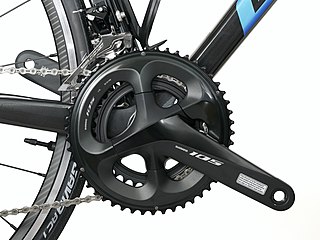
The crankset or chainset is the component of a bicycle drivetrain that converts the reciprocating motion of the rider's legs into rotational motion used to drive the chain or belt, which in turn drives the rear wheel. It consists of one or more sprockets, also called chainrings or chainwheels attached to the cranks, arms, or crankarms to which the pedals attach. It is connected to the rider by the pedals, to the bicycle frame by the bottom bracket, and to the rear sprocket, cassette or freewheel via the chain.

A bicycle chain is a roller chain that transfers power from the pedals to the drive-wheel of a bicycle, thus propelling it. Most bicycle chains are made from plain carbon or alloy steel, but some are nickel-plated to prevent rust, or simply for aesthetics.

A single-speed bicycle is a type of bicycle with a single gear ratio. These bicycles are without derailleur gears, hub gearing or other methods for varying the gear ratio of the bicycle.
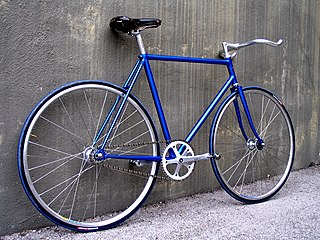
A fixed-gear bicycle is a bicycle that has a drivetrain with no freewheel mechanism such that the pedals always will spin together with the rear wheel. The freewheel was developed early in the history of bicycle design but the fixed-gear bicycle remained the standard track racing design. More recently the "fixie" has become a popular alternative among mainly urban cyclists, offering the advantage of simplicity compared with the standard multi-geared bicycle.

Gear ratios of bicycles are relative measures of bicycle gearing giving an indication of the mechanical advantage of different gears, which combined with the wheel diameter determines how far the bicycle advances per pedal or crank revolution.
SRAM LLC is a privately owned bicycle component manufacturer based in Chicago, Illinois, United States, founded in 1987. SRAM is an acronym comprising the names of its founders, Scott, Ray, sAM,. The company produces a range of internally developed cycling components, including Grip Shift, separate gravel, road, and mountain drivetrains from 7 to 12 speed. SRAM developed the Eagle line of mountain bike specific drivetrain components intended to improve shifting performance. SRAM was also the first to release a dedicated "one by" drivetrain with a single front chain-ring.
SR Suntour is a Taiwanese manufacturer of bicycle components, formed in 1988 when Osaka based SunTour (Maeda) went bankrupt and was purchased by Sakae Ringyo Company, a major Japanese maker of aluminum parts, particularly cranks and seat posts. SunTour's sales and commercial success peaked from the late 1970s to the mid-1980s.
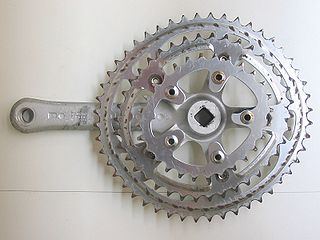
Biopace is a tradename for a type of ovoid bicycle chain ring manufactured by Shimano from 1983 to 1993 The design was intended to help overcome the "dead zone" where the crank arms are vertical and riders have little mechanical advantage.

A freehub is a type of bicycle hub that incorporates a ratcheting mechanism.

A front freewheel or freewheel crank is a freewheel mechanism used on some bicycles which enables the drivetrain of the bicycle to continue spinning while the rider rolls, but stops pedaling, or coasts. Unlike regular bicycles, a front freewheel can make it possible to shift gears using a derailleur while the rider is coasting if paired with a fixed rear hub or a freehub with a slight resistance in the freewheel mechanism, which causes the chain to continue spinning with the wheel rotation.

Bicycle gearing is the aspect of a bicycle drivetrain that determines the relation between the cadence, the rate at which the rider pedals, and the rate at which the drive wheel turns.
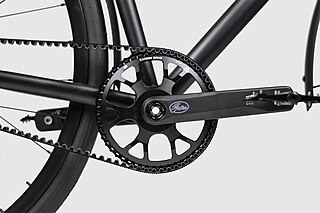
A belt-driven bicycle is a chainless bicycle that uses a flexible belt, typically a synchronous toothed design, in order to transmit power from the pedals to the wheel.

Sheldon Brown was an American bicycle mechanic, technical expert and author. He contributed to print and online sources related to bicycling and bicycle mechanics, in particular the web site Sheldon Brown's Bicycle Technical Info. His knowledge of bicycles was described as "encyclopaedic" by The Times of London.
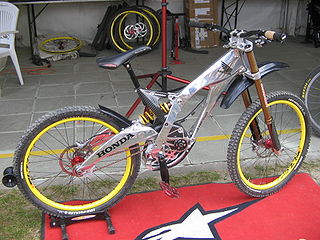
The Honda RN-01 G-Cross is a mountain bike produced by Honda specifically for downhill racing events. Honda is not a manufacturer of bicycles and this bike is not commercially available to the general public. It was introduced in the 2004 racing season by the Team G Cross Honda who competed in the NORBA and Mountain Bike World Cup points series races.
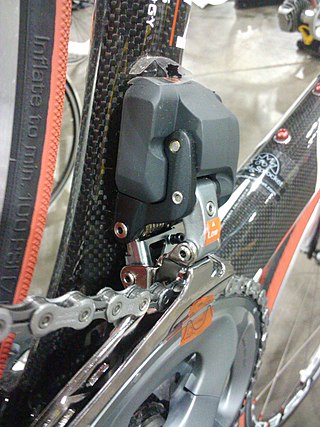
An electronic gear-shifting system is a method of changing gears on a bicycle, which enables riders to shift with electronic switches instead of using conventional control levers and mechanical cables. The switches are connected by wire or wirelessly to a battery pack and to a small electric motor that drives the derailleur, switching the chain from cog to cog. An electronic system can switch gears faster and, because the system does not use Bowden cables and can calibrate itself, it may require less maintenance.

Bicycle drivetrain systems are used to transmit power on bicycles, tricycles, quadracycles, unicycles, or other human-powered vehicles from the riders to the drive wheels. Most also include some type of a mechanism to convert speed and torque via gear ratios.

A Schlumpf Drive is a two-speed planetary gear assembly for use on bicycles and unicycles. It is distinct from other bicycle planetary gear assemblies in that it is located behind the chainring rather than in the rear hub. A push-button on each side of the axle allows the rider to switch between high and low ratios. These are operated by the rider's heel.

























